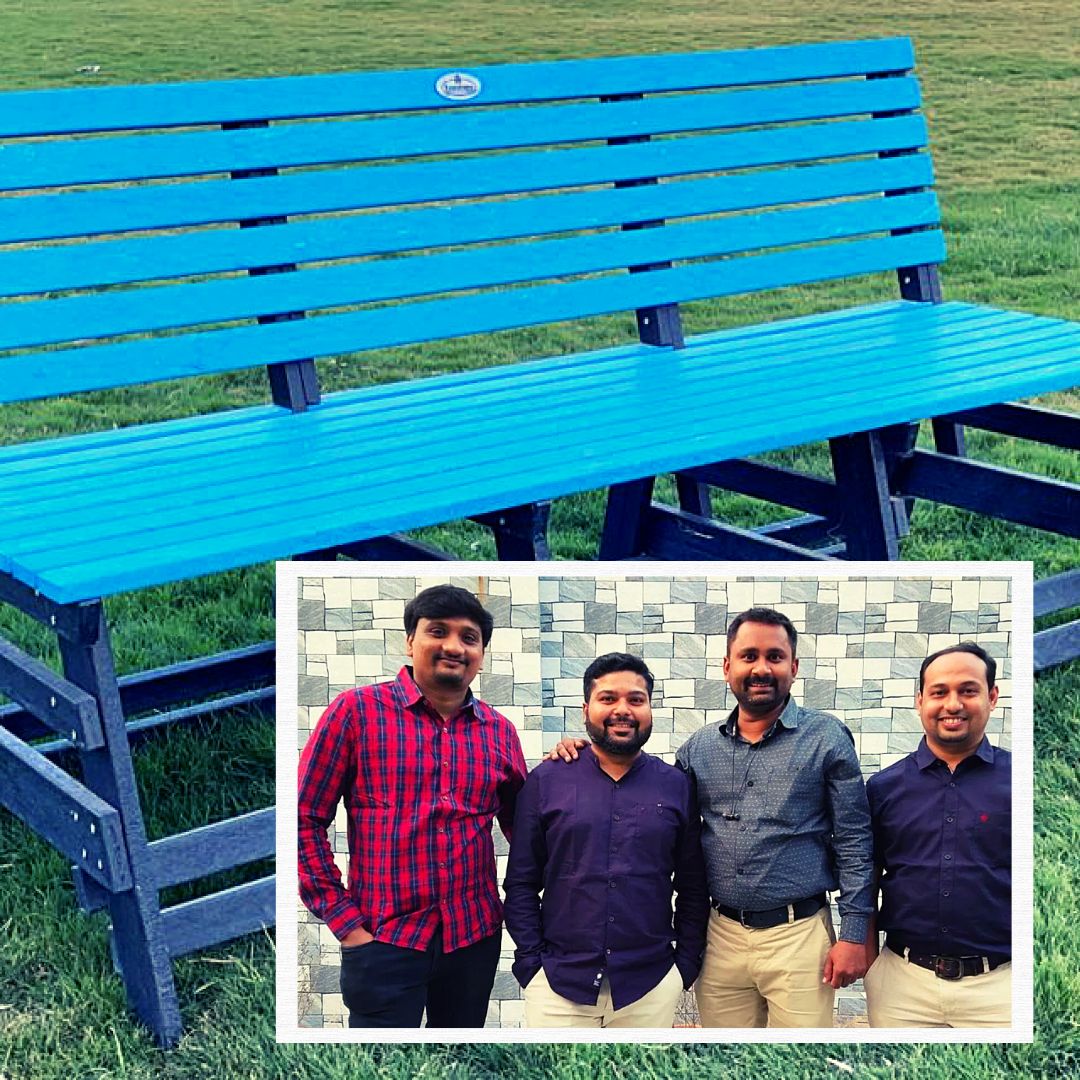
Image Credits: Econiture
This Startup Converts Recycled Plastic Into Sustainable Furniture, Segregated Over 2500 Metric Tons Of Dry Waste
India, 19 Jun 2022 3:58 AM GMT
Editor : Shiva Chaudhary |
A post-graduate in Journalism and Mass Communication with relevant skills, specialising in content editing & writing. I believe in the precise dissemination of information based on facts to the public.
Creatives : Tashafi Nazir
For most people, journalism sounds hectic and chaotic. For her, it's a passion she has been chasing for years. With an extensive media background, Tashafi believes in putting efforts on presenting a simple incident in the most interesting way.
Econiture furniture is made from 100% recycled plastic, which diverts plastic waste that would have been destined for a landfill or ocean. The recycled plastic lumber is nonporous, nontoxic, and a clean product free from any metallic inclusions.
Plastic waste is a 100-year-old problem, with around 90 per cent of it not recycled and later dumped into landfills. This waste keeps lying in the ecosystem for centuries because of its durability and inability to degrade. However, four individuals from Maharashtra's Amravati city thought differently and considered plastic a resource rather than waste.
They formed Recycle Bell Private Limited, also known as Econiture, under its brand name RE-BELL which tries to solve the problem of urban waste management. It minimises the amount of waste sent to the landfills and increases the number of recyclables recovered from the trash.
It focuses on the dry component of the total waste, which constitutes 20-25 per cent of the waste generated and is tough to manage. The operations deal with collecting dry waste material, its segregation and selling it to authorised recyclers.
RE-BELL works on the principle of a circular economy where waste is recycled into new products. The company's ultimate objective is to provide a recycling solution for every recyclable.
What Is Econiture Furniture?
Econiture furniture is made from 100% recycled plastic, which diverts plastic waste that would have been destined for a landfill or ocean. Econiture epitomises versatility and innovation that can be achieved in post-consumer plastic waste. The recycled plastic lumber is nonporous, nontoxic, and a clean product free from any metallic inclusions. These products are eco-friendly because it lessens deforestation and saves natural resources. Econiture Benches manufacturing process does not use any chemicals or colour pigment while manufacturing.
"This furniture has many benefits over wooden and metal furniture. It does not rust or rot and is completely waterproof. It is termite-proof and perfect for outdoor as well as indoors. It is long-lasting, durable, and strong. Most importantly, it will never ever go to a landfill since it is recyclable. Even after years of usage, it can again be converted into some new products," Madhur Rathi, CEO and Co-founder at Econiture, told The Logical Indian.
During his MBA tenure, Rathi developed his interest in waste management and started researching more about the field. After completing his degree, he joined a waste management company and gained much more insight into it.
"There, I saw a problem that recyclers are mixing "Virgin" or new plastic with recycled or reprocessed plastic to make products. After I returned to my hometown Amravati, I, along with three of my childhood friends, started Recycle Bell Private Limited in 2017," he shared.
"We wanted to make a product in which no "Virgin" plastic was used, and it should be equally or more durable. Then, after 1.5 years, we finally launched Econiture in 2019," he added.
The company has so far collected and segregated more than 2500 metric tons of dry waste and recycled more than 20,000 kg of plastic waste into furniture. Further, it has sold over 1,800 units of furniture to more than 1,200 unique customers across 25 states and five union territories.
From Collecting Waste To Making Furniture
The company collects all types of dry waste, like plastic articles, plastic films, and paper, from the formal as well as the informal sectors. Then this waste is brought to the material recovery facility, where it is segregated into over 100 recyclables. After processing, it is sold as a raw material to recyclers for further recycling.
Out of all the recovered and segregated dry waste, some types of plastic polymer and plastic film are kept by the company. Using the extrusion process, it manufactures plastic beams or lumbers from them. Then wood machining is performed like cutting, screwing, and drilling to make Econiture furniture. The product range includes chairs, stools, dining tables, dining sets, bar chairs, bar sets, racks, shelves, benches, kids' furniture, and planters, among others.
"Everyone says that plastic is a threat to the environment. But plastic itself is one of the biggest inventions of the century, and technology has helped us make our vision a reality. According to us, overuse and improper end-life management of plastic is the biggest threat to our environment. We are just trying to solve this," Rathi said.
How Is Waste Management Beneficial For Environment?
The entrepreneur believes that recycling has a vital role to play in environmentalism. It reduces the carbon footprints in the environment and lessens the pace of climate change.
"Preventing waste generation and reusing can decrease the need to extract "virgin" resources from forest covers, oil fields, and mines to make items and packaging," he said.
In a country like India, where it is estimated that more than three million trucks worth of garbage is untreated and disposed of every day in an unhygienic manner, management of waste is a crucial thing. Apart from its environmental benefits, recycling also has a significant impact on the economic front.
"It is economically rewarding, which makes it a win-win situation for both the planet and the people," he concluded.
Also Read: At Least 1 In 4 Abortions Are Done At Home In India, UP Tops The List: Govt Data
 All section
All section














